- What John Lennon Thinks of Donald Trump - November 14, 2016
- The Meaning of Fun: The Paul is Dead Rumor - February 3, 2016
- BEATLES-STREEP-SHEA SHOCKER: IT’S NOT HER!!!! - August 13, 2015
The news today that Cynthia Lennon, ne Powell, is dead at the age of 75 has hit me, and I’m certain many others, with unexpected force.
As her book A Twist of Lennon (one of the better Beatles-insider memoirs) made clear—without ever seeming bitter or vengeful about it—sweet Cynthia often got the shit end of the genius stick. She and John, I gather, shared most of their best times together early on, before fame; she was one of the things, perhaps the most important thing, that kept him, and so the band, together and moving forward.
I’m not one to ever justify or minimize the collateral human damage wreaked by the needs, wants, tantrums, and lies of even so rare an individual as John Lennon. But any Beatles fan needs to recognize the importance to their story of Cynthia’s constancy, and John’s ability to rely on her. Without her, he wouldn’t have been the John that he was, good and bad, and without John, the Beatles wouldn’t have been—anything, really.
I hope the love of fans throughout Cynthia’s life helped make up for some of the rest of it.

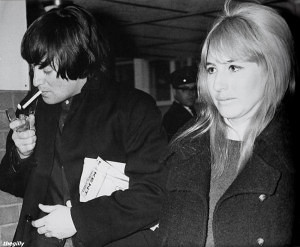
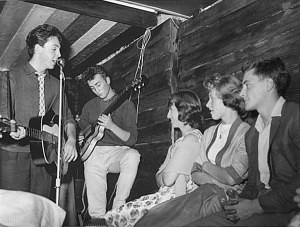
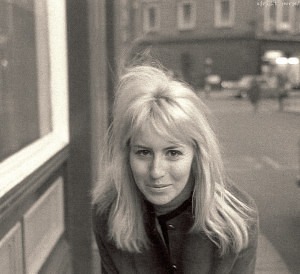


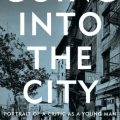
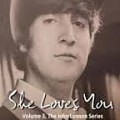




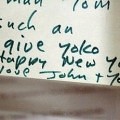
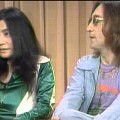
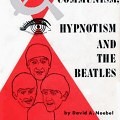
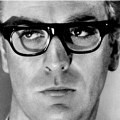
Look at that picture of Paul singing to Cynthia. That has to be, what, 1960, latest? They’re still playing their Zenith guitars, etc. What I want to know is, what I keep searching to discover is: how good were they, then? The evidence indicates that they were nothing special before the first trip to Hamburg. That makes sense: in 1958(?) when John’s mom died, they took a 15-month hiatus. By 1960 they had probably played less than 100 times in public. They had written, by Paul’s count in “Many Years from Now”, maybe four songs (not the 100 he claimed originally!) — how did they go from this, to that unstoppable juggernaut of 1962? When did the genius make itself known? Was it innate, or did they teach themselves something during that time? Anyway, I can’t fathom the titanic, exceptional, eternal quality of the Beatles. There’s nothing like it in all of music except for Bach, Beethoven, Mozart. They’re really at that level, when it comes to sheer consistent quality. Where did it come from! The odds of so much genius appearing at random in one northern English town in the 40s is too high. It must have been space aliens…
Something I’ve always wondered, and never gotten an answer to, is the following, especially poignant in light of Cynthia Lennon’s passing earlier today: In the film Let It Be, during the rooftop performance of ‘Don’t Let Me Down’, there is a cutaway shot of two ladies sitting on the street below listening, and sitting next to a red phone booth/box. Is this Cynthia Lennon? My guess is yes, but it has never been talked about or written about. It certainly looks like her (with sunglasses on, so as not to be recognized), and it’s not unlikely that Paul, Ringo or Maureen (who were all there and her friend) told her. After all, she was a Beatles fan from the beginning, and it was only fitting she be there at the end of their performing career–so while she was on the street below, she still could hear it.
Thoughts?
Jim, that’s a good question. It’s a possibility. I honestly don’t know. I haven’t read her books. If she was there for the rooftop concert, she would have mentioned it. It’s a nice dramatic twist.
Well said, Devin. Cynthia–and Julian–suffered a huge amount of collateral damage, and I hope that the love of some fans has partially compensated for that.
Whatever her failings, Cynthia certainly didn’t deserve the public shaming she received at Lennon’s hands. Her acknowledgement that she felt John belonged with Yoko has always seemed to me brave and heartbreaking, given that she discovered Yoko wearing her robe, in her house, after a night spent having sex with John while he and Cynthia were still married. And that proved to be just the prelude to Lennon’s verbal denigration of her in the months and years to come.
Just saw that Yoko has issued a statement that “I’m very saddened by Cynthia’s death. She was a great person and a wonderful mother to Julian.” I was glad to see that.
Rest in peace, Cynthia.
Sir Hud Fud: I think you answer your own question. Hamburg. The evidence (of which there’s amazingly much, since they were recording themselves almost from the very beginning) shows they were nothing special–at best competent, at worst crappy–before going to Hamburg in August 1960. In Liverpool, music was seldom a paying job, and so they had no reason to work any harder than they wanted to. In Hamburg, it was put up or shut up, do it or screw it. They had genius, yes, and ambition, but to come to the surface, the one needs pressure and the other needs a vehicle. Hamburg gave them both, and left them a work ethic they never abandoned until solo days. I think it’s really as simple as that.
I think it’s impossible to overestimate the contribution of Cynthia Lennon to the Beatles story. She — like Julia, Stu, Astrid and the Exis, and most of all Brian — were essential handmaidens to John’s development as a person and artist. And that is, perhaps, why Cyn was such a bad fit once John became famous. She “knew him when,” and since he didn’t like who he’d been then (otherwise there would’ve never been any reason to do all the hard work and become a Beatle), every time he saw her, he might’ve thought, “She knows I’m not all that, not really.” I’m guessing of course, but it’s the story of first wives since forever; when a man becomes what he thinks he wants to be, he jettisons everybody who helped him get there — hiding the evidence, as it were. For the same reason, it’s not at all certain that Stu and John would’ve remained close had Stu lived; more likely they would’ve grown apart — with some rancor, knowing John. The battles between John and Stu would’ve felt like early 70s John and Paul; Stu would’ve pushed a lot of the same buttons Yoko did/does — “Oh you’re successful, but you’re not a REAL artist.”
It was good of Cynthia not to talk too harshly about John, but I don’t just think that was saintliness on her part; telling the truth too early would have brought down a ton of fan ire upon her, and for what? So I think she took the high road at first because she had to, and later because she’d aged into it. Nobody’s perfect, as we all learn.
My major thought on Cyn has always been the irony that John discouraged her from finishing art school (is this correct? Was it actively or passively, via getting her pregnant?), then left her for an artist. Who knows what kind of artist Cynthia Powell might’ve become? Who knows what kind of intellect she had? While John rather ruthlessly filled his life with people who enabled him to become John Beatle, Cyn did not — and that lack of ruthlessness isn’t the same as a lack of intellect or artistic talent. Fans think she was just a housewife because post-divorce John said she was just a housewife; but she was, to some degree, the product of the life he, and his bullshitty Northern chauvinism allowed her to have. In her early and mid-twenties, Cynthia Powell simply could not fight through both chauvinism AND the Beatle experience to find her own personhood. I’m having a difficult time imagining anyone who could.
Michael to try to answer the question of whether Cyn finished art college, I’m fairly certain she did. I think she finished in 1961 if I’m not mistaken, and she began to train as an art teacher after she finished.
Another stray question: do we know any songs that John (or any Beatle) wrote for Cyn?
Michael,
The only song I think we know for sure is “Ask Me Why,” which I’ve read in a couple of books (don’t have them with me and can’t cite which ones offhand, but I want to say Spitz…maybe someone knows?) he wrote around the time they got married, probably in a passing moment of affection toward her. It’s also likely that “You Can’t Do That” and “If I Fell” are about/inspired by Cynthia.
More interesting to me is whether Cyn in any way influenced the lyrics to “Girl.” I know the conventional wisdom, from John, is that Girl is about some ideal woman who turned out to be Yoko, in the end, and I’m sure that’s some of it. But it’s also doubtful to me that John came up with lines like “When I think of all the times I’ve tried so hard to leave her, she will turn to me and start to cry/And she promises the earth to me and I believe her, after all this time, I don’t know why” without thinking of sweet, loyal Cyn. Likewise “Will she still believe it when he’s dead?”, in the final verse, given that Cynthia’s father died when she was young, too.
Also, I wanted to draw DullBlog’s attention to this article in the Daily Mail: http://www.dailymail.co.uk/femail/article-3026005/Yes-lost-John-woman-WASN-T-Yoko-25-years-ago-Beatle-s-former-wife-Cynthia-shared-secret-biographer-told.html. The first caveat, of course, is that it’s the Daily Mail, and they’ll print just about anything. But I’ve read the Cogan stuff in other places (definitely Norman, I think Goldman, etc.), and it seems to be pretty well accepted that John and Alma had an affair in the mid-Sixties. What’s fascinating is how this actually further explains what was going on with John in late 1966 and beyond: another person he feels some deep kinship with, possibly loves, who represents another possible link to recovering the relationship with Julia and/or the structure offered by Mimi, dies. What do we know happens? John goes on an ongoing acid bender, and by the time he meets Yoko around November 9 (who knows if this is the precise date, but it’s around then), he’s been up for a few days, tripping on LSD, probably fueled by speed or cocaine, too, and—apparently—grief stricken over Cogan’s death. There’s a quote from George to the effect that John was very upset when Alma died. And, as Cyn notes, Yoko stepped into that void.
I never understood what John meant when he said that Girl was about “a dream girl”. A masochist’s dream girl maybe. Seems to me he didn’t remember what the song was about, or any of the lyrics, when he made that statement. He seems to have decided in the moment, to say it was about a dream girl and of course that just had to be Yoko who happened to be sitting next to him.I agree Michael, that the lyrics seem to be more about Cyn and the state of their marriage at the time, or at the very least someone else he was trying to end it with.
Linda, I think that actually gets to the core of what made John tick. To him, that WAS a dream girl. I don’t think he saw it as someone who would torment him psychologically. I think to Lennon, the girl in that song is devoted (“she promises the earth to me,” even after he’s cheated on her), strong (she puts you down when friends are there), ethereal and unforgettable (“all about the girl who came to stay”), wounded and sad (the way John was—see the whole last verse) and desirable and unattainable—the way Julia probably appeared to John. In a way, it’s a blending of the structure, strength, and torment Mimi inflicted combined with the quasi-ethereal desirability of Julia. I also think it’s a totally intuitive depiction; Lennon doesn’t realize how much he’s showing his psyche here.
All that said, I agree with you that Cynthia seems to also be all over these lyrics in the two verses I mentioned. But she would never have put him down when friends are there, and it certainly doesn’t seem like there was a wanting her so much it makes you sorry/sex-guilt thing the way there was with Yoko—and that, of course, may help explain why Yoko exerted a pull on him that Cyn never could.
Michael your thoughts on Girl are very interesting. I never realized any of that, I suppose I was interpreting the song too literally. When you lay all that out the way you did I can definitely see what you mean. Indeed John was actually revealing a lot about himself. I had forgotten the lyric about wanting her so much it makes him sorry. Definitely NOT about Cyn and more in keeping with this idea of a dream girl. There are so many layers to the song, I can see why it has always been one of my favorites.
I think the ultimate expression of John’s attitude to Cynthia during the Beatles’ heyday was ‘No Flies On Frank’ –
“He journeyed downstairs crestfallen and defective — a great wait on his boulders — not even his wife’s battered face could raise a smile on poor Frank’s head — who as you know had no flies on him. His wife, a former beauty queer, regarded him with a strange but burly look. ‘What ails thee, Frank? she asked stretching her prune. ‘You look dejected if not informal,’ she addled.
“Tis nothing but wart I have gained but twelve inches more tall heavy than at the very clock of yesterday at this time — am I not the most miserable of men? Suffer ye not to spake to me or I might thrust you a mortal injury; I must traddle this trial alone.’ ‘Lo! Frank — thous hast smote me harshly with such grave talk — am I to blame for this vast burton?’
Frank looked sadly at his wife — forgetting for a moment the cause of his misery. Walking slowly but slowly toward her, he took his head in his hands and with a few swift blows gad clubbed her mercifully to the ground dead. ‘She shouldn’t see me like this,’ he mubbled, ‘not all fat and on her thirtysecond birthday.’…
…He gathered her in a small sack (for she was only four foot three) and headed for her rightful home. Frank knocked on the door of his wife’s mothers house. She opened the door.
‘I’ve brought Marian home, Mrs. Sutherskill’ (he could never call her Mum). He opened the sack and placed Marian on the doorstep.
‘I’m not having all those flies in my home,’ shouted Mrs. Sutherskill (who was very houseproud), shutting the door. ‘She could have at least offered me a cup of tea,’ thought Frank lifting the problem back on his boulders”
Dan, I’m poleaxed. That’s a great connection. The unhappiness and feeling of being trapped, of wanting to lash out but knowing that’s unfair, of wanting to change things but to what…?
I think the ultimate expression of John’s attitude to Cynthia during the Beatles’ heyday was ‘No Flies On Frank’
I wonder if he was feeling the same way about Yoko in 1980.
Cynthia has always struck me as being present in John’s songs mainly as an absence–e.g., the unmentioned little-woman-at-home of “Norwegian Wood”–our knowledge of whose existence is completely dependent on our knowledge of biographical facts external to the songs.
I’m reacquainting myself just now with the opening of Skywriting by Word of Mouth, John’s nearest attempt at autobiography outside of his interviews, and a drawn-out exercise in self-congratulating douchebaggery almost as insufferable as “Watching the Wheels.” Quotes:
“I’d never met anyone worth breaking up a state of happily-married boredom for. Escape, at last! Someone to leave home for! … Yoko, though shy herself, picked up my spirits enough to give me the courage to get the hell out, just in time for me to avoid having to live with my ex-wife’s new nose.”
It continues on about that same level of charm. Now I remember why I’ve only read this once.
I think it’s telling that Lennon needed someone to escape with — someone both to motivate him to do it and to be with him afterward — before he could leave Cynthia. Meanwhile, Julian is the one who’s entirely erased in Lennon’s rapturous recountings of how he fled with Yoko.
And Dan, the link you make between “No Flies on Frank” and Lennon’s attitude toward Cynthia is chilling and plausible. The spiral of treating someone badly, feeling ashamed/powerless to stop, and treating her even more badly sure sounds like Lennon’s feelings toward Cynthia.
[A much longer, better comment on this just got eaten by my phone. Trying to recreate it below.]
@Devin, I also read it only once — as prep for Life After Death for Beginners — and what I remember was the numbing self-justification that ran through Skywriting, the utter lack of critical distance on his own behavior, and lack of empathy for anybody who wasn’t himself or Yoko. For anybody who’s a grownup, it’s rather appalling. How could a young man whose charm was built so firmly on a nose for bullshit — his own as well as others’ — be so deluded by middle age?
It reminded me of the times when I’d met someone with a car-crash of a life — damage and destruction as far as the eye could see — and how they all seemed to have one thing in common: a terrifying certainty, this pugnacious self-belief that THEY knew right and nobody else did. I say “terrifying” because this, and not the immediate circumstance, was the engine of incredible suffering inevitably to come. We all make mistakes, but it’s the willful ignorance of reality for egotistical/emotional reasons that really sets the world ablaze.
Skywriting and Lennon’s other post-75 attempts at autobiography strike me as someone who knows he’s fucked up, but is too scared to actually see someone — so he does for himself what he thinks a psychiatrist might do. “So, do you think you wanted to have intercourse with your mother?” Playtime, designed to avoid what’s really going on.
The thing that’s great about In His Own Write/Spaniard is that, for all their wordplay, they strike me as fundamentally honest — see the passage quoted above. Though he was a consummate musician who could strike any pose, Lennon circa 1964/5 simply wasn’t trained enough as a writer to do anything but vomit his psyche onto the page. What a fascinating psyche, in the midst of a fascinating period! In the end it’s that honesty that makes the earlier books genuine literature, important to their period, and Skywriting merely a failed attempt at PR. This is the curse of post-68 John Lennon.
and Skywriting merely a failed attempt at PR.
I don’t think it was written as a failed attempt at PR. It was released by Yoko after his murder. She even admitted he wouldn’t have put it out there if he’d lived. I think he was bored and because he thought of himself as an Arteest he forced himself to sit in front of the typewriter, without a clear plan. Autobiography? Another “in his own write”? It fails at both. It’s a disappointing book, barely readable and very offputting.
If his assassin had choked on a bone in Hawaii, or had otherwise been prevented from visiting NYC, it’s highly unlikely John would have released “Skywriting” (at least the version we know).
@Sam, wasn’t Skywriting part of J&Y’s vague plans to do something on Broadway in the late 70s? The same thing that spurred “India, India”?
I didn’t know that.
I remember reading an interview where he said he’d been typing stuff without any purpose, but that much of it wasn’t right and he didn’t think he’d publish it. I don’t remember where I saw the interview – it was years ago. I think he was feeling guilty about not making records and felt obligated to be creating SOMETHING because he was always calling himself an artist in interviews.
He wrote some unflattering things about Cynthia. I’ve always suspected he wrote some equally unflattering things about Yoko and Mintz, but those bits didn’t make it into the final posthumous book.
For the truest picture of John and Cynthia’s marriage, see Hunter Davies’ biography. Hidden within all the fluff are some nuggets of truth, particularly the chilling portrait of the Lennon’s home life. Both Cynthia and John basically admit that they have no meaningful communication and that John only cares about the other Beatles. What’s particularly interesting is that Cynthia also talks about being bored and frustrated, so it was not just John who felt trapped.
If this is what they were willing to share with an official biographer who was writing what amounted to a whitewash, imagine how miserable things really were.
Beasty, good point about how the Lennons’ marriage is portrayed in the Davies biography. And that admission by both Cynthia and John that “John only cares about the other Beatles” reminded me of Paul’s saying at some point during/after the breakup that John didn’t love the Beatles anymore now that he loves Yoko (paraphrasing here — anyone have a better memory?)
It’s saddening to reflect that John’s commitment to the Beatles might have been driven by a kind of emotional void in his marriage. And saddening to contemplate the possibility that his subsequent relationship with Yoko wasn’t nearly as satisfying as he portrayed it. He was often great at making his unhappiness into art, but what deep unhappiness it seems to have been.
Michael, I think you’re quite right about the tie between Skywriting and the notional musical–not only “India” but “Mirror Mirror on the Wall” and “She’s a Friend of Dorothy” and “Whatever Happened To … ?” were a part of the same brainstorm. (I’d stand to be corrected on that, and could confirm easily enough by going to Google, but the Internet makes us too afraid to go out on the merest limb of imperfect memory, so if I’m wrong, I’m wrong.)
In the sense that everything John peddled about himself and Yoko in later days was PR, Skywriting was PR, whether or not it would ever have seen the light of day.